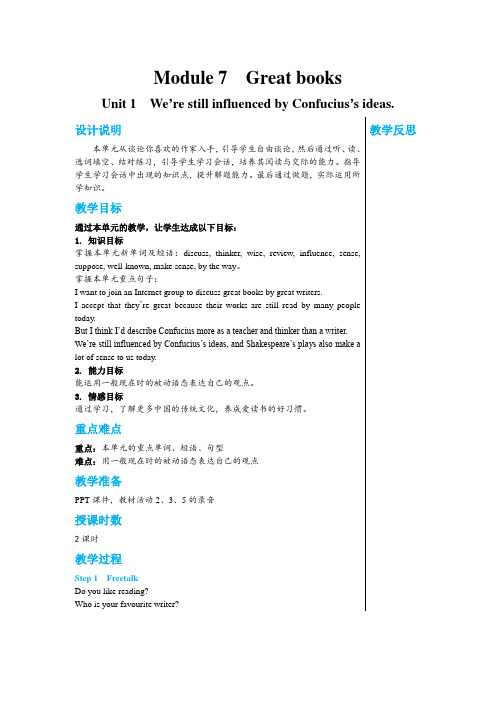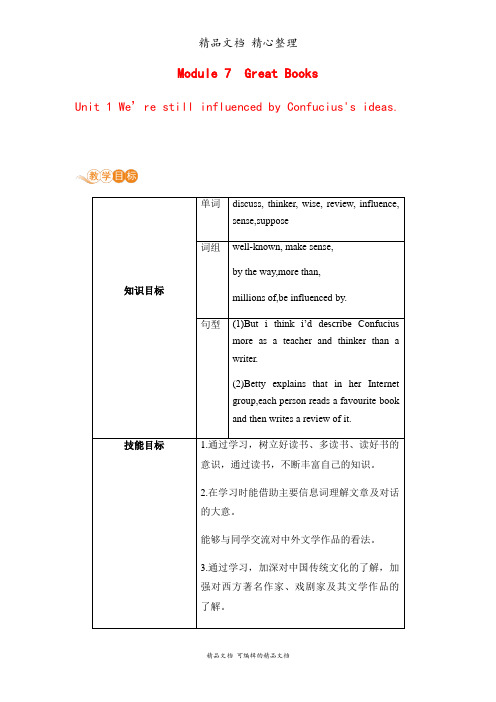2019-2020年九年级英语上册 Module 7 Unit 1教案 外研版
外研版九年级上册英语《Module 7 Great books Unit 1》教学设计2

外研版九年级上册英语《Module 7 Great books Unit 1》教学设计2一. 教材分析外研版九年级上册英语《Module 7 Great books Unit 1》的主要内容是关于文学作品的介绍。
通过阅读和理解文学作品,学生可以提高自己的阅读能力和文学素养。
本节课的主要目标是让学生能够理解文学作品的内容,并能够运用所学知识进行相关的口语表达和写作。
二. 学情分析九年级的学生已经具备了一定的英语基础,对于文学作品也有一定的了解。
但是,对于一些文学专业术语和表达方式可能还不够熟悉。
因此,在教学过程中,需要注重帮助学生理解和运用这些专业术语和表达方式。
三. 教学目标1.能够理解文学作品的内容和主题。
2.能够运用所学知识进行相关的口语表达和写作。
3.能够提高自己的阅读能力和文学素养。
四. 教学重难点1.文学专业术语和表达方式的运用。
2.对于文学作品主题的理解和表达。
五. 教学方法采用任务驱动法和人本教学法,通过设定相关的任务,引导学生主动参与学习,注重培养学生的自主学习能力和合作精神。
同时,注重激发学生的学习兴趣,营造轻松愉快的学习氛围。
六. 教学准备1.教师准备相关的文学作品材料,包括文本和图片等。
2.学生准备笔记本和笔,以便记录和整理学习内容。
七. 教学过程1.导入(5分钟)通过展示一些著名的文学作品,引导学生谈论自己对文学作品的看法和喜好,激发学生的学习兴趣。
2.呈现(10分钟)教师展示文学作品的相关材料,包括文本和图片等,引导学生阅读和理解文学作品的内容。
3.操练(10分钟)学生分组讨论,运用所学知识进行相关的口语表达,教师进行指导和评价。
4.巩固(10分钟)学生根据所学内容,进行写作练习,教师进行指导和评价。
5.拓展(10分钟)学生进行小组讨论,探讨文学作品的主题和意义,教师进行指导和评价。
6.小结(5分钟)教师对所学内容进行总结,强调文学作品的的重要性和价值。
7.家庭作业(5分钟)学生根据所学内容,完成相关的家庭作业,巩固所学知识。
外语教研版中学英语九年级上Module 7 Unit 1教案详案

Module 7 Great booksUnit 1 We’re still influenced by Confucius’s ideas.设计说明教学反思本单元从谈论你喜欢的作家入手,引导学生自由谈论,然后通过听、读、选词填空、结对练习,引导学生学习会话,培养其阅读与交际的能力。
指导学生学习会话中出现的知识点,提升解题能力。
最后通过做题,实际运用所学知识。
教学目标通过本单元的教学,让学生达成以下目标:1. 知识目标掌握本单元新单词及短语:discuss, thinker, wise, review, influence, sense,suppose, well-known, make sense, by the way。
掌握本单元重点句子:I want to join an Internet group to discuss great books by great writers.I accept that they’re great because their works are still read by many peopletoday.But I think I’d describe Confucius more as a teacher and thinker than a writer.W e’re still influenced by Confucius’s ideas, and Shakespeare’s plays also make alot of sense to us today.2. 能力目标能运用一般现在时的被动语态表达自己的观点。
3. 情感目标通过学习,了解更多中国的传统文化,养成爱读书的好习惯。
重点难点重点:本单元的重点单词、短语、句型难点:用一般现在时的被动语态表达自己的观点教学准备PPT课件,教材活动2、3、5的录音授课时数2课时教学过程Step 1 FreetalkDo you like reading?Who is your favourite writer?Who are they?What do you know about them?ConfuciusShakespeareMark TwainStep 2 Listening and reading1. Listen and complete the sentences.1 Confucius is well-known in many countries.2 Shakespeare wroteplays and poems.3 Mark Twain’s stories are set in the southof the US.2. Listen and choose the correct answers.1How many great writers do they mention?()A. Two. B. Three. C. Four.2What is Mr. Jackson’s favourite book?()A. The Adventures of Huckleberry Finn.B. The Adventures of Tom Sawyer.C. Romeo and Juliet.Answers:1 B 2 B3. Listen again and check(√)the true sentence(s).1 Confucius is only a writer.2 We are still influenced by Confucius’s ideas.3 Shakespeare’s novels also make a lot of sense to us today.4 Mark Twain is a great English writer in the nineteenth century.Answer(s):2√4. Read the conversation and complete the sentences.1 I think I’d describe Confucius _________ as a teacherand thinker _________ a writer.2 We __________ still _________ __________Confucius’s ideas.3 Shakespeare’s plays also ________________________________________to us today.4 Mark Twain is a great ___________ _______in the nineteenth century. Answers:1more; than 2are; influencedby3make a lot of sense4Americanwriter5. Read and match the people with the descriptions.6. Listen and repeat Activity 3. Pay attention to pronunciation.7. Complete the passage with the correct form of the words in the box.accept discuss influence review sense thinker wise Mr Jackson and Betty are(1)_________ great writers. Betty explains that in her Internet group, each person reads a favourite book and then writes a(n)(2)________ of it. Mr Jackson(3)________ that Confucius and Shakespeare are great because their works are still read by people today, but he thinks Confucius was more a teacher and(4)________ than a writer. He says that Confucius was a very(5)__________ man. Mr Jackson thinks that we are still(6)___________ by Confucius’s ideas and that Shakespeare’s plays still make(7)_________ to people today.Answers:(1)discussing(2)review(3)accepts(4)thinker(5)wise(6)influenced(7)senseStep 3 Language points1. Well, maybe Confucius and Shakespeare. 噢,可能是孔子和莎士比亚。
新外研版九年级上册英语 Module 7 Unit 1 教案(教学设计)

Module 7 Great BooksUnit 1 We’re still influenced by Confucius's ideas.单词discuss, thinker, wise, review, influence,4.能够谈论自己喜爱的书籍和作家。
5.掌握一般现在时被动语态的概念和用法。
能够听懂谈论人物或文学作品的对话。
并能在一般现在时的被动语态的用法。
能够通过对话学习,对孔子、莎士比亚、马克吐温这三位伟大的人物有基本的认识,在交流中鼓励不同层次的学生敢于发表自己的观点。
Step 1情景导入T:There are many famous writers and thinkers in the world. How many do you know?S1:Lu Xun is a great writer.T:You\'re right. Who else?S1:Shakespeare is a great writer.T:Do you know Confucius?S2:Yes, I do. He was a teacher, a thinker. He was also a writer.T:Today, we will learn more about them.Step 2完成教材 Activities 1,2的任务1.Work in pairs. Look at the pictures.Say who the people are and why they are famous. Now listen and check your answers. (Activity 1)(1)教师先提供一些词汇,供学生讨论使用。
例如:great, influence, play, poem, respect, story, thinker, thought, wise, writer 等。
Module 7 Unit 1 教学设计外研版九年级英语上册

九年级上册Module 7 Unit 1We’re still influenced by Confucius’s ideas.开头语:Hello boys and girls. Welcome to our happy lesson. I’m glad to be your teacher. (点击鼠标)(停顿)P1今天由我带领大家进行九年级上册第7模块的学习,本模块的标题是Great books。
在本节课中,我们将通过Unit 1 We’re still influenced by Confucius’s ideas.相关内容的学习,进行听力和口语表达的练习。
(点击鼠标)P2首先,我和大家分享本节课的内容分析。
(点击鼠标)P3第一单元的对话是由贝蒂想参加一个网上有关名著的讨论而展开的。
贝蒂和杰克逊先生的对话提及了孔子和莎士比亚这样的伟人,同学们可以围绕这个话题展开讨论,总结一下自己阅读过的名著并与大家分享感受。
对话呈现了被动语态的用法,同学们可以在真实的语境中感受这一抽象的语法现象。
(点击鼠标)P4本节课我们的学习目标有三个:1/ 101. 能够听懂关于名著的对话。
2. 能够初步理解和运用一般现在时的被动语态。
3. 能谈论你最喜欢的书籍、戏剧、诗歌和作家。
(点击鼠标)P5本模块的标题是Great books。
(点击鼠标)P6When we talk about ‘Great books’, what books and writers will come to our mind?(点击鼠标)当我们谈论名著的时候,我们会想到哪些作品和作家呢?(点击鼠标)Maybe The Journey to the West by Wu Cheng’en, (点击鼠标)Tea House by Laoshe (点击鼠标)or Robinson Crusoe by Daniel Defoe. 可能是吴承恩的《西游记》,老舍的《茶馆》,或者是丹尼尔·笛福的《鲁滨逊漂流记》。
外研版九年级英语上册教案Module 7 Unit 1

Module 7Great books Unit 1We’re still influenced byConfucius’s ideas.教材分析This is the first lesson in this module. The listening material is information about great book s. It’s a good text to help the students improve their listening strategies, such as getting information from the listening material.教学目标【知识目标】I. Key words:discuss, wise, review, influence, sense, suppose, well-knownII. Key phrases:make sense, by the way, more...than..., as...as..., join inIII. Key sentences:(1) Their works are still read by many people today.(2) But I think I’d describe Confucius more as a teacher and thinker than a writer.(3) We’re still influenced by Confucius’s ideas.(4) I suppose he isn’t as well-known as Confucius or Shakespeare.【能力目标】I. To understand dialogues about characters and great books.II. To talk about their favorite books.【情感目标】I. To read more good books through learning.II. To enrich their knowledge【教学重点】I. Key words:discuss, wise, review, influence, sense, suppose, well-knownII. Key phrases:make sense, by the way, more...than..., as...as..., join inIII. Key sentences:(1) Their works are still read by many people today.(2) But I think I’d describe Confucius more as a teacher and thinker than a writer.(3) We’re still influenced by Confucius’s ideas.(4) I suppose he isn’t as well-known as Confucius or Shakespeare.【教学难点】To train their listening and speaking abilities.课前准备Multimedia教学过程Step I Warming up and leading in(I) Warm upT shows some pictures about great books home and abroad.(II) Lead inSs talk about their favorite books and writers.(III) IntroductionIntroduce Confucius, Shakespeare and Mark Twain.(IV) Practice1. Listen and check your answers to Activity 1.2. Listen again and complete the sentences.【设计意图】让学生掌握一些描述作家、思想家以及他们代表作的词汇,从而为后面听对话、读短文以及模块任务的开展做好铺垫。
Module 7 Unit 1公开课教学设计(外研版九年级英语上册)

Module 7 Great books
Unit 1 We’re still influenced by
Confucius’s ideas.
教学设计
教学目标
1. 能够正确使用下列单词和词组:discuss, thinker, wise, review, influence, sense, make sense, by the way, suppose, well-known
2. 能够听懂谈论人物或文学作品的对话。
3. 能够谈论自己喜欢的文学作品。
4. 能够与同学交流对中外文学作品的看法。
教学重难点
1. 能够听懂谈论人物或文学作品的对话。
并能在一般现在时的被动语态的用法。
(重点)
2. 能够通过对话学习,对孔子、莎士比亚、马克·吐温这三位伟大的人物有基本的认识,在交流中鼓励不同层次的学生敢于发表自己的观点。
(难点)
教学过程。
Module7Unit1外研版英语九年级上册单元教案

今天的教学活动中,我发现学生们对旅行话题表现出浓厚的兴趣,这为学习现在完成时态提供了一个很好的背景。在导入新课环节,通过提问学生的旅行经历,成功引起了他们对本节课的关注。课堂上,我尝试将理论知识与实际情境相结合,让学生在互动中掌握现在完成时态的用法。
在新课讲授过程中,我发现有些学生对现在完成时态的构成和用法掌握不够牢固,尤其是在与一般过去时的区别上。为了帮助学生突破这个难点,我使用了大量的例句和对比练习。从学生的反馈来看,这种方法有一定的效果,但仍需在今后的教学中继续巩固。
-时态理解:现在完成时态的构成和用法对于学生来说可能抽象,需要通过生动的例子和对比来加深理解。
-阅读分析:学生可能在提取课文中的关键信息时遇到困难,需要指导如何使用阅读策略。
-听力理解:学生可能在听力过程中遇到语速快、口音重等困难,需要提高听力技巧和解码能力。
举例:
-学生在造句时可能会混淆词汇的用法,如将“souvenir”误用为动词。
3.成果分享:每个小组将选择一名代表来分享他们的讨论成果。这些成果将被记录在黑板上或投影仪上,以便全班都能看到。
(五)总结回顾(用时5分钟)
今天的学习,我们了解了现在完成时态的基本概念、重要性以及在旅行描述中的应用。通过实践活动和小组讨论,我们加深了对这一时态的理解。我希望大家能够掌握这些知识点,并在日常生活中灵活运用。最后,如果有任何疑问或不明白的地方,请随时向我提问。
举例:
-学生能够正确拼写并运用新词汇编写关于旅行的句子。
-学生能够使用现在完成时态描述自己的旅行经历,如:“I have visited Beijing twice.”
-学生能够从课文中找出作者旅行的主要活动和感受。
-学生能够听懂并回答关于旅行经历的听力问题。
新外研版英语九年级上册教案 Module7 Unit 1

Module 7Great booksUnit 1We’re still influenced by Confucius’s ideas.◇目标导航◇◇教学过程◇一、方法指导1.预习Page 56的生词,做到会读并知意。
2.预习Page 56的对话,了解对话主题并能够翻译对话。
二、预习检测Ⅰ.英汉互译1.顺便说一下by the way2.作为……著名be famous as/be well-known as3.make sense易理解;合情理;有意义4.more...than...与其说是……不如说是……5.join in参加Ⅱ.根据首字母及汉语提示补全单词1.Have you ever read any works(作品) by Shakespeare?2.What will influence(影响) your decision about what to study in college?3.As a student,you should respect(尊重) your teachers.4.The radio says it’s going to rain this afternoon,so it’s wise(睿智的) of you to take your umbrella.5.My English teacher knows a lot about the English literature(文学).Ⅲ.根据句意用所给词的适当形式填空1.Jay Chou is known(know) as a great singer.2.Journey to the West is thought(think) to be one of the greatest Chinese books.3.Would you like to read(read) The Adventures of Tom Sawyer?4.The students are often told(tell) to take good care of their desks and chairs.5.Don’t you know Confucius is a famous thinker(think) of China?Ⅳ.单项填空(C)1.I don’t want to you.You must decide for yourself.A.talkB.knowC.influenceD.hear(D)2.Confucius’s works still read by many people today?A.DoB.IsC.DoesD.Are(A)3.It’s raining heavily.take a raincoat with you?A.Why notB.Why don’tC.Would you mindD.Would you like(A)4.—Hi,Jim.—Could I borrow your bike?A.What’s up?B.Do you have matter?C.It’s kind of you.D.How are you?(B)5.Wang Junkai a famous star.A.is known toB.is known asC.is known forD.is known ofStep1情景导入Teacher:Hello,everyone.Do you like reading?What’s your favourite book?Who’s your favourite writer?Why is he/she your favourite writer?We will learn about some famous writers this class.Step2完成教材Activity1和2的任务1.认真观察Activity 1中的图片,说出这些人物都是谁以及他们为什么著名。
- 1、下载文档前请自行甄别文档内容的完整性,平台不提供额外的编辑、内容补充、找答案等附加服务。
- 2、"仅部分预览"的文档,不可在线预览部分如存在完整性等问题,可反馈申请退款(可完整预览的文档不适用该条件!)。
- 3、如文档侵犯您的权益,请联系客服反馈,我们会尽快为您处理(人工客服工作时间:9:00-18:30)。
2019-2020年九年级英语上册 Module 7 Unit 1教案外研版
一、教材分析:
本模块首先以Tony找父亲拍的澳大利亚的照片引出谈论澳大利亚的主题,接下来通过一封发给父母的信件进一步介绍澳大利亚的人文、地理、饮食、文化等。
旨在让学生对澳大利亚有一个初步的了解,以此激发学生对世界的关注和热爱。
Unit 1 以澳大利亚地理及人文为切入点,是本模块的导入课。
话题切近同学生活,符合初中生强烈的好奇心与探索欲,对同学进一步的语法及知识的学习有导入和引领的作用。
二、学情分析:
九年级学生年龄正处于对新鲜事物有强烈的好奇心,以及求知欲望的阶段,所以本课就利用旅游这一话题,激发学生的参与热情,调动起他们的学习积极性与主动性,发挥主动意识,积极参与课堂,从而达到我们的教学目的。
三、教学目标:
(1) 知识目标:
词汇:Shark, camel, kangaroo, hand, have a look at, alongside
句型:What are you up to?/ Would you like a hand…/ Have a kook at/ Alongside/
I bet you do
(2) 能力目标:
能够听懂有关介绍澳大利亚的短文及对话;表达对旅游的认识及意义;能够介绍自己的旅游经历,同时掌握并能运用相应的表达方式
(3) 情感目标:
了解不同国家的风景,自然与文化,增强民族意识;培养学生对自然和生活的热爱之情。
四、重点与难点:
本单元重点:句型表达、短文听力
本单元难点:Travel 思维拓展及口语演讲
五、教具使用:录音机、图片
六、教学方法:听说法
七、教学过程
Step1. Warming ---up
T: It’s a pity that I know you just now, but the term is over, summer holiday is around the corner. What do you want to do on your summer vacation?
S: reading /sleeping/ watching TV/ travel etc
T: where have you been?
S: Nanning/Beijing/ Shanghai etc
T: what’s the feeling of travel?
要么读书,要么旅行,身体和心灵必须有一个在路上。
Why?
What does travel give us?
S:Some possible answers: curiosity/ relax/happiness/forget/broaden the mind/challenge/ independence/ the feeling of belonging to the nature/ experience / purify one’s soul
设计意图:旅游话题激起同学们的兴趣,旅游的意义开放性问题启发同学们的思考。
Step2.Lead--in
T:I guess most places that we have ever been are in our county. Today, what
I want to remend is a country outside of China.
Please guess which country it is.
The Olympic Games was held in one city of this country in xx.
It is a country in the Oceania(大洋洲)
It is the largest English-speaking country in the southern part of the world.
There is a very famous white opera house.
Which country is it?
S: Australia
T: When we e to Australia, which kinds of things e into your mind? What are the symbols of the country?
Some pictures of the famous animals and places
Kangaroo(袋鼠): a special animal. Where is her baby?
Koala(考拉): it sleeps during the day and eats at night. Just like what?
Camel(骆驼): kind and useful. Helps people travel in the desert.
Shark(鲨鱼)/ whale(鲸)
Sydney opera house
Uluru(乌奴奴): a huge rock that can change its color—from golden to
pink/ red/ purple…
Great Barrier Reef(大堡礁)
设计意图:利用直观图片,为引出后面的听力内容做铺垫,动物及地理标志做简单那介绍,增强记忆及趣味性,丰富地理知识。
Step3.Listening
1. Look at the table(Activity 4) to know what information should we care about
before listening.
2. Listen and plete the table.
3. Check the answer with the class.
设计意图:锻炼学生的听力水平,以及捕捉关键信息点的能力。
Step4.Listening and Reading
1. Read the questions of Activity 5 before listening.
2. Listen and answer the questions
3. Read the text and check the answer.
4. Play the dialogue of Activity 3 for the students.
设计意图:锻炼学生的阅读能力和朗读能力,强调对学生正确知识的输入,同时培养学生的自信心。
Step5.Explanation
Find the following phrases
What are you up to? / what are you doing?
Would you like a hand…/ give me a hand
Have a look at
Jump alongside the car
I bet you do
设计意图:激发学生的参与热情,调动起他们的学习积极性与主动性,发挥主动意识,积极参与课堂 , 掌握基本知识。
Step6.Speaking
Give the students several minutes to talk about their own experience of tour or the place where they . Then ask some of them to speak in front of the class.
设计意图:利用这一练习锻炼学生的口语表达能力,同时也锻炼了学生对于知识输出能力的培养。
Step7.Homework
Review the grammar----Restrictive attributive clause with that.
设计意图:难点语法知识,提前预习。
板书设计
Unit 1 I’m looking for the photos that you took in Australia.
Kangaroo(袋鼠):
Koala(考拉):
Camel(骆驼)
Shark(鲨鱼)/ whale(鲸) Sydney opera house
Uluru(乌奴奴): …
Great Barrier Reef(大堡礁) What are you up to? / what are you doing? Would you like a hand…/ give me a hand Have a look at
Jump alongside the car
I bet you do。
